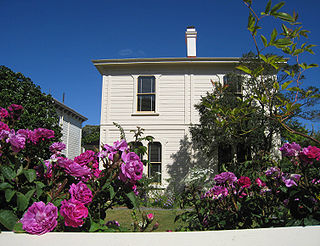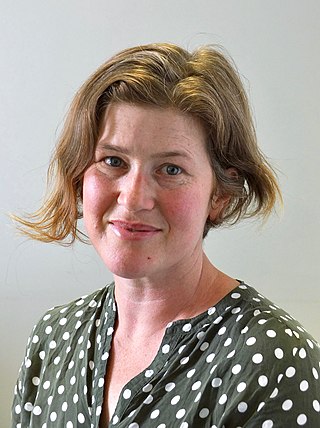
Kathleen Mansfield Murry was a New Zealand writer and critic who was an important figure in the modernist movement. Her works are celebrated across the world and have been published in 25 languages.

New Zealand literature is literature, both oral and written, produced by the people of New Zealand. It often deals with New Zealand themes, people or places, is written predominantly in New Zealand English, and features Māori culture and the use of the Māori language. Before the arrival and settlement of Europeans in New Zealand in the 19th century, Māori culture had a strong oral tradition. Early European settlers wrote about their experiences travelling and exploring New Zealand. The concept of a "New Zealand literature", as distinct from English literature, did not originate until the 20th century, when authors began exploring themes of landscape, isolation, and the emerging New Zealand national identity. Māori writers became more prominent in the latter half of the 20th century, and Māori language and culture have become an increasingly important part of New Zealand literature.

Maurice Gough Gee is a New Zealand novelist. He is one of New Zealand's most distinguished and prolific authors, having written over thirty novels for adults and children, and has won numerous awards both in New Zealand and overseas, including multiple top prizes at the New Zealand Book Awards, the James Tait Black Memorial Prize in the UK, the Katherine Mansfield Menton Fellowship, the Robert Burns Fellowship and a Prime Minister's Award for Literary Achievement. In 2003 he was recognised as one of New Zealand's greatest living artists across all disciplines by the Arts Foundation of New Zealand, which presented him with an Icon Award.

Elizabeth von Arnim, born Mary Annette Beauchamp, was an English novelist. Born in Australia, she married a German aristocrat, and her earliest works are set in Germany. Her first marriage made her Countess von Arnim-Schlagenthin and her second Elizabeth Russell, Countess Russell. After her first husband's death, she had a three-year affair with the writer H. G. Wells, then later married Frank Russell, elder brother of the Nobel prize-winner and philosopher Bertrand Russell. She was a cousin of the New Zealand-born writer Katherine Mansfield. Though known in early life as May, her first book introduced her to readers as Elizabeth, which she eventually became to friends and finally to family. Her writings are ascribed to Elizabeth von Arnim. She used the pseudonym Alice Cholmondeley for only one novel, Christine, published in 1917.

Catherine Chidgey is a New Zealand novelist, short-story writer and university lecturer. She has published eight novels. Her honours include the inaugural Prize in Modern Letters; the Katherine Mansfield Fellowship to Menton, France; Best First Book at both the New Zealand Book Awards and the Commonwealth Writers' Prize ; the Acorn Foundation Fiction Prize at the Ockham New Zealand Book Awards on two occasions; and the Janet Frame Fiction Prize.

Christian Karlson "Karl" Stead is a New Zealand writer whose works include novels, poetry, short stories, and literary criticism. He is one of New Zealand's most well-known and internationally celebrated writers.

Surprise Lake Camp is a non-profit sleepaway camp located on over 400 acres (1.6 km2) in North Highlands, New York. It is the oldest Jewish summer camp in the United States.

Katherine Mansfield House and Garden was the early childhood home of Katherine Mansfield, a prominent New Zealand author. The building, located in Thorndon, Wellington, is classified as a Category 1 Historic Place by Heritage New Zealand.
Anne Kennedy is a New Zealand novelist, poet, and filmwriter.

Sir Vincent Gerard O'Sullivan was a New Zealand poet, short story writer, novelist, playwright, critic, editor, biographer, librettist, and academic. From 1988 to 2004 he was a professor of English literature at Victoria University of Wellington, and in 2013 he was appointed the New Zealand Poet Laureate.
Charlotte Grimshaw is a New Zealand novelist, short-story writer, columnist and former lawyer. She has written both fiction and non-fiction, often drawing on her legal experience. Her short stories and longer works often have interlinked themes and characters, and feature psychological and family dramas.
The Katherine Mansfield Menton Fellowship, formerly known as the New Zealand Post Katherine Mansfield Prize and the Meridian Energy Katherine Mansfield Memorial Fellowship, is one of New Zealand's foremost literary awards. Named after Katherine Mansfield, one of New Zealand's leading historical writers, the award gives winners funding towards transport to and accommodation in Menton, France, where Mansfield did some of her best-known and most significant writing.

Maata Mahupuku, also known as Martha Grace and Martha Asher, was the muse and lover of short-story writer Katherine Mansfield. Of Māori ancestry, descended from a New Zealand tribal leader, she identified with the Ngati Kahungunu iwi.

Sue Wootton is a New Zealand writer, specialising in poetry and short fiction.
In a German Pension is a 1911 collection of short stories by the writer Katherine Mansfield; her first published collection. All but three of the stories were originally published in The New Age edited by A. R. Orage; the first to appear was "The Child-Who-Was-Tired". The last three were first published in this collection, and her biographer Anthony Alpers thinks that two were probably rejected by Orage for The New Age.

Sarah Laing is a New Zealand author, graphic novelist and graphic designer.
Margaret Allan Scott was a New Zealand writer, editor and librarian. After her husband's early death in 1960, she trained as a librarian, and was appointed as the first manuscripts librarian at the Alexander Turnbull Library. She was the second recipient of the Katherine Mansfield Menton Fellowship in 1971.
Lisa Greenwood is a New Zealand novelist. She was the 1990 recipient of the Katherine Mansfield Menton Fellowship, one of New Zealand's foremost literary awards.
Rowan Metcalfe (1955–2003), also known as Rowan Pahutini, was a New Zealand novelist, short-story writer, poet, editor and journalist. She won the Katherine Mansfield Memorial Award for a short story in 1997, having won the Young Writers award in 1974, and her first and only novel Transit of Venus was published posthumously in 2004.
Alice Maria Glenday was a New Zealand novelist, short-story writer and playwright. Born in Canada, she moved to New Zealand in 1949 as a young married woman, and began writing in the mid-1950s. In 1969 she was the first woman to receive the Katherine Mansfield Memorial Award for her short story "One Fine Day". She published two novels, Follow, Follow (1973) and A Population of One (1991), and won several playwriting competitions run by the British Drama League.












